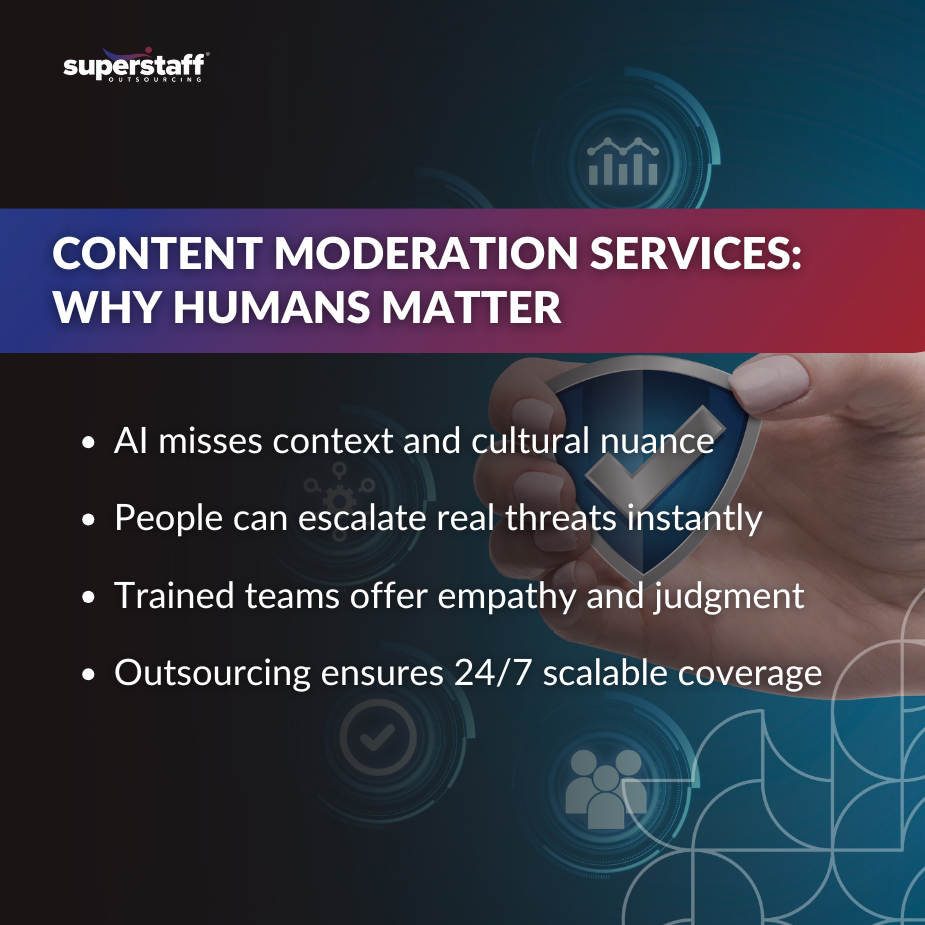
Algorithms Can’t Catch Everything—And Sometimes, They Get It Wrong
A photo taken out of context. A joke mistaken for hate speech. A comment that seems harmless until it spreads like wildfire. These are just some of the many blind spots that algorithms can’t handle alone. In today’s digital world, where every user has a platform, content can go viral in seconds—and so can the damage. That’s why businesses need more than automation. They need content moderation services that bring in real people—trained to think, respond, and protect.
For platforms flooded with user-generated content, relying on filters alone isn’t enough. The risk to reputation, user safety, and brand trust is too high. This blog explores why human-in-the-loop content moderation services offer a deeper layer of protection—and how outsourcing to the right partner makes it scalable, cost-efficient, and culturally aware.
Why Filters Alone Can’t Keep You Safe

AI-powered filters can scan millions of posts in seconds, flagging anything that looks suspicious. But that’s where their power ends. The truth is, these filters often catch the wrong things—and worse, they miss the real threats. Satire, sarcasm, or coded language can all fly under the radar. At the same time, innocent posts get wrongly flagged, leading to frustrated users and public backlash.
Let’s say a post includes violence—but it’s a news report. Or someone uses profanity in a post that’s actually supportive. Filters aren’t trained to understand these nuances. What you end up with is a moderation system that’s fast but flawed. That’s where content moderation services that include human judgment fill the gap.
These services introduce a second layer of review—real people who understand context. They know the difference between hate speech and a heated debate, between cyberbullying and friendly banter. Without them, your brand risks becoming the headline in the wrong kind of story.
Empathy, Judgment, and Real-Time Action—What Humans Bring to the Table
A major edge of human moderators is their ability to process meaning, tone, and emotion. They’re not just reading words—they’re interpreting intent. They can tell when something is sarcastic or genuinely harmful. When content flirts with the line, people—not machines—make the best decisions.
Think about fast-evolving cultural trends. AI takes time to learn new slang, emojis, or subtle codes that pop up in online subcultures. Human moderators, on the other hand, are part of these cultures. They live in them, scroll through them, and understand the language that comes with them. This cultural fluency is what makes human content moderation support a key differentiator.
Beyond accuracy, human moderators are also better equipped to respond to high-risk content. They can escalate posts or profiles immediately, alerting the appropriate teams before harm is done. It’s this responsiveness that makes content moderation services far more than a safety net—they become a real-time shield.
Why Outsourcing Makes Smart Business Sense
Managing an in-house moderation team is expensive and time-consuming. You need to hire, train, monitor, and support a workforce around the clock. And if your platform scales quickly, you may find yourself scrambling to keep up. That’s why more companies are turning to content moderation outsourcing.
With the right partner, you gain access to trained professionals who operate in shifts across time zones, giving you 24/7 protection. During high-traffic periods—like political elections, product launches, or viral campaigns—outsourcing allows you to scale up quickly without sacrificing quality.
There’s also the cost factor. Outsourcing allows businesses to tap into experienced moderation teams at a lower cost than building one internally. Whether you need multilingual support or platform-specific protocols, a skilled outsourcing partner can tailor content moderation services to meet your exact needs—without draining your budget.
What to Look for in a Trusted Content Moderation Partner
Not all outsourcing providers are created equal. When choosing a content moderation outsourcing partner, it’s critical to look beyond the basics. Accuracy is important, yes—but so is empathy, mental health, and compliance.
A reliable provider will have proven experience working with similar platforms or industries. They’ll have clear escalation protocols, and their moderators will be trained in handling everything from graphic violence to misinformation, based on your brand’s guidelines.
Moderator well-being is another key consideration. Content moderation support can be emotionally taxing. Without proper support systems, burnout leads to mistakes—and mistakes can lead to PR disasters. A high-quality partner will have mental health programs in place, helping moderators stay resilient and focused.
Compliance should also be non-negotiable. Your provider must be equipped to meet regional and global data privacy standards, such as GDPR and CCPA. This ensures your user data—and your reputation—stay protected.
In short, a great partner treats content moderation services as a business-critical function, not just a back-end operation. They understand that their work directly affects user trust, brand image, and long-term success.
The Real-World Value of Human Moderation
You don’t always hear about the content that gets blocked, flagged, or de-escalated in time—and that’s the point. The most effective moderation efforts are the ones you never see. But behind every averted crisis, there’s a human making a decision.
Consider platforms that manage to avoid trending for the wrong reasons. It’s not luck—it’s strong, proactive moderation. Human moderators can spot harmful trends before they spiral. They remove or quarantine dangerous content that filters might miss, preserving both user safety and brand reputation.
Even more, the presence of human moderators often leads to improved platform engagement. When users know there’s a real person watching out for their experience, they feel safer. That sense of security leads to longer sessions, better reviews, and higher loyalty.
Platforms that invest in human-led content moderation services aren’t just preventing harm—they’re actively building communities based on trust.
Why Human Moderators Protect Users Better Than Bots
Automation will always be part of the solution. It’s fast, scalable, and efficient for initial filtering. But it lacks heart. Human moderators bring compassion, experience, and cultural awareness to every decision they make.
When it comes to protecting children, monitoring hate speech, or enforcing community standards, nuance matters. A bot might flag a meme as offensive without understanding it’s a joke. Or worse, it could miss something dangerous because the language didn’t trigger any rules.
This is how human moderators protect users better than bots—by reading between the lines, understanding tone, and responding with speed and empathy. They reduce false positives, minimize risk, and create better online environments for everyone involved.
If your goal is to build a safe, inclusive, and brand-safe platform, the human touch isn’t optional—it’s critical.
Content Moderation Services That Truly Safeguard Your Brand
In today’s fast-moving digital environment, content moderation services are no longer a nice-to-have—they’re a must. But not all services are created equal. Filters and bots can help, but they simply can’t handle the complexity of online interactions.
Human moderators offer something that machines can’t: real judgment. They see what bots miss, respond with empathy, and protect your brand in ways no algorithm can replicate. Combined with the right outsourcing strategy, content moderation services become a competitive advantage—one that helps you scale safely and maintain user trust.
SuperStaff’s content moderation solutions go beyond filters. Our trained human teams are available 24/7, ready to make fast, thoughtful, and culturally intelligent decisions that protect your users and elevate your platform. If you’re ready to level up your trust and safety strategy, partner with us today. Let’s make the internet safer—together.






